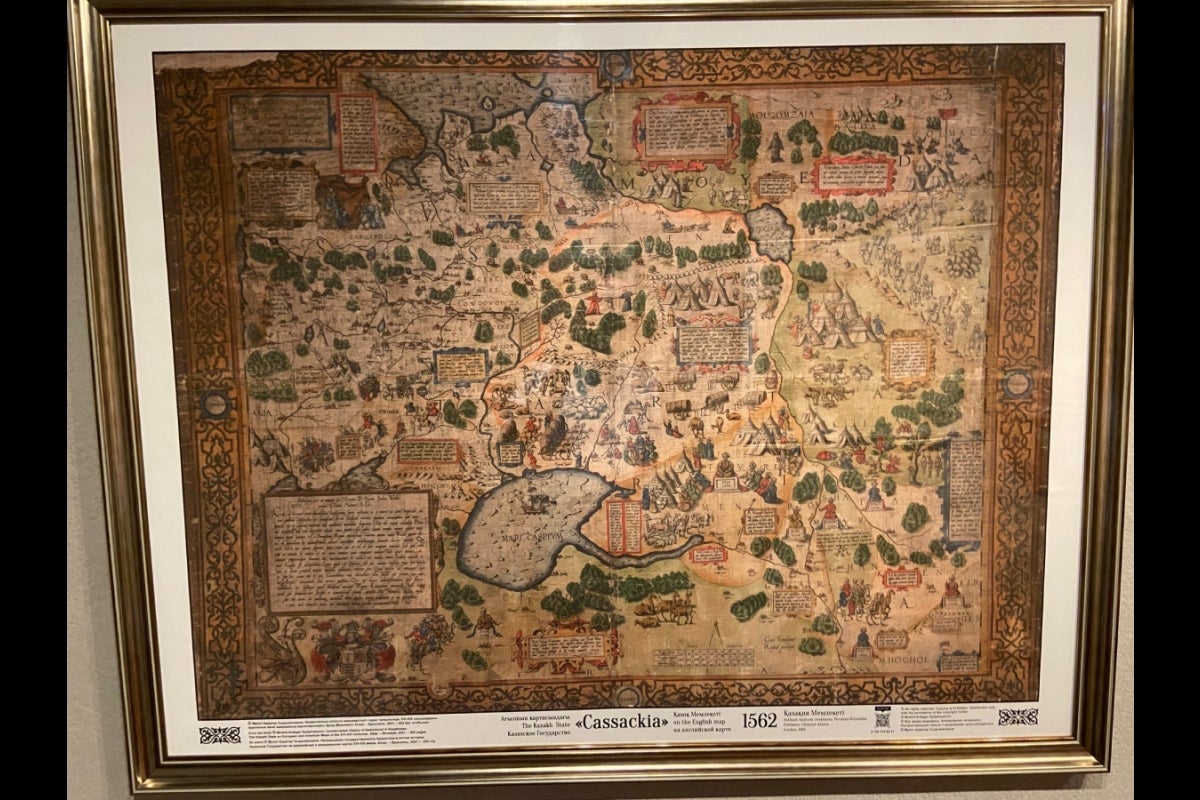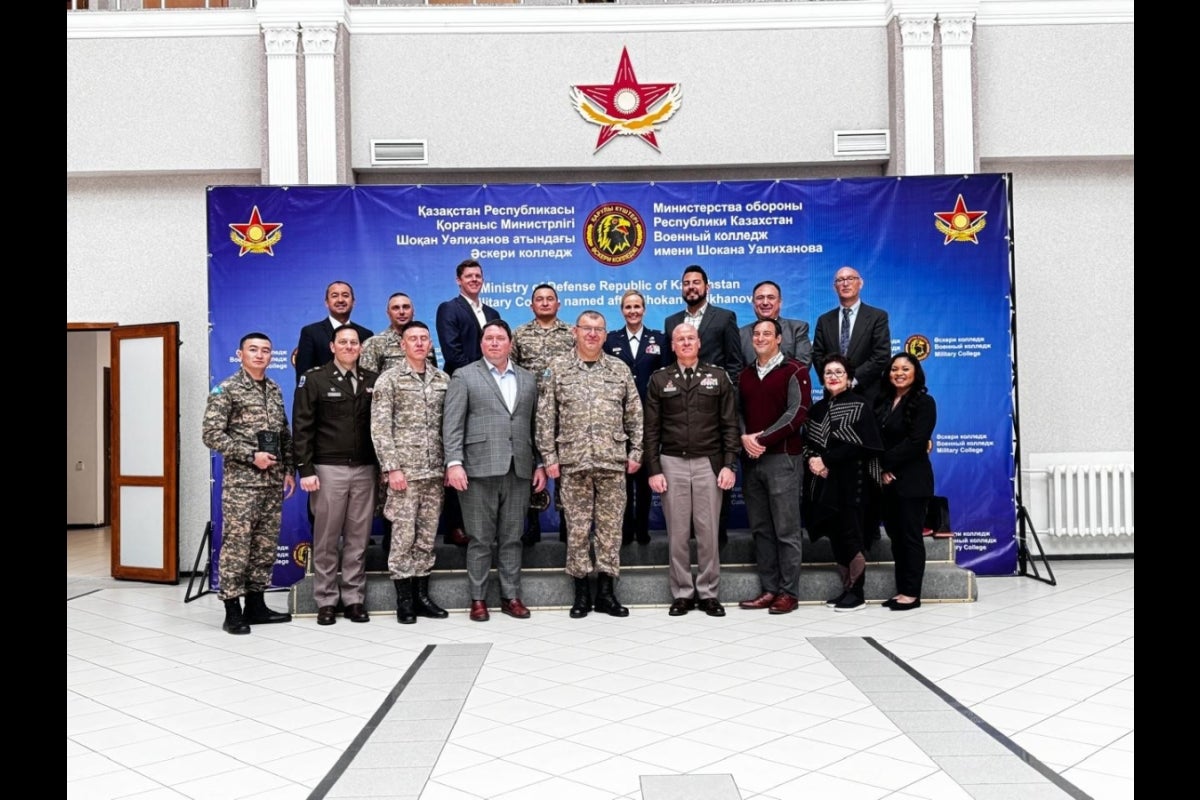Building Partnership between Arizona and Kazakhstan
Arizona's Delegation, including the AZ National Guard and ASU Faculty, meets with the U.S. Ambassador to Kazakhstan.
In September 2024, Melikian Center Director Keith Brown and Russian professor Saule Moldabekova Robb joined an Arizona delegation to Kazakhstan. The delegation traveled first to Almaty, home to 2 million citizens and 38 Universities, and spent time in the capital city of Astana, and in Petropavl, in North Kazakhstan. As well as briefings at the US Consulate in Almaty and the Embassy in Astana, the delegation had meetings at the Ministry of Foreign Affairs, and visited several universities and educational institutions, including Almaty Management University, powered by ASU.
The visit, which included representatives from state agencies and the governor’s office, was organized through the State Partnership Program (SPP) between Arizona and Kazakhstan. Launched in 1993, this SPP is led by Arizona’s National Guard, which for the past thirty years has sent soldiers and airmen to Kazakhstan to participate in joint exercises, including Steppe Eagle, and to contribute to capacity-building in several areas, including international peacekeeping and emergency management. The partnership program also aims to increase cooperation across all aspects of international civil-military affairs and to encourage people-to-people ties at the state level. Through the SPP, and exchange programs like FLEX and Fulbright, as well as Tucson’s longstanding sister-city relationship with Almaty, many Kazakhs have visited Arizona.
Current Kazakh Ambassador Yerzhan Ashikbayev visited ASU in 2021 and returned to Arizona in December 2023. On the most recent visit, he met with Governor Hobbs who traveled to Oman to establish Arizona’s newest State Partnership Program earlier in the year. Ambassador Ashikbayev invited Governor Hobbs to visit Kazakhstan 2025, which would be the first visit by an Arizona governor in the program’s 31-year history. The September delegation was tasked with identifying potential contact points in commerce, education, and culture where the governor’s visit could advance the partnership for the benefit of the citizens of both Arizona and Kazakhstan.
The country’s connections with Arizona are physical as well as cultural. Kazakhstan hopes to boost tourism, especially eco-tourism, at locations like Charyn Canyon, second only to Arizona’s Grand Canyon in scale and grandeur. Kazakhs also value their nomadic origins in the broad steppes of Central Asia, built around yurt-dwelling and animal herding. In the most recent World Nomad Games, held in Astana, Kazakhstan dominated the medal table across sports including horseback wrestling, archery and asyk atu, a game of skill where players pitch sheep ankle bones. In part because of their experience of Russian colonialism and Soviet-era cultural assimilation, Kazakhs feel an affinity with the American Indian experience, providing another point of contact with Arizona.
For Brown and Moldabekova, the visit affirmed ASU’s ties in Kazakhstan. Besides the Almaty Management University (AlmaU) connection and the Fulton School of Engineering’s new engagement with KOREM (Kazakhstan’s Energy operator), the Melikian Center has worked with the Institute of International Education to provide pre-departure orientations for US Fulbrighters to Central Asia since 1989, and has provided Kazakh language training through its Critical Languages Institute since 2021. While in Astana, the delegation met with former Fulbright scholar (2021) Beibit Shangirbayeva, and—wholly unexpected—Critical Languages Institute alumnus Andrew Horsfall (Ukrainian, 2020), now stationed in Astana as an Army Foreign Area Officer (FAO).
“Traveling with policy professionals was a reminder that we can accomplish more in partnership than we can working alone,” said Keith Brown. Among the issues facing citizens and leaders in both Kazakhstan and Arizona are water security, energy diversification, workforce development and climate change resilience—all of which demand collaboration between government, private sector and higher education. Arizona is a national leader in this regard, creating a business environment that attracted substantial foreign direct investment. As Kazakhstan pursues its goal of carbon neutrality by 2060—moving away from reliance on oil and gas production, managing its mineral wealth sustainably, and expanding its capacity in renewables, including solar and wind—knowledge exchange with trusted partners will be key. ASU’s continued people-to-people partnership with collaborators in Kazakhstan hopes to further these goals.




